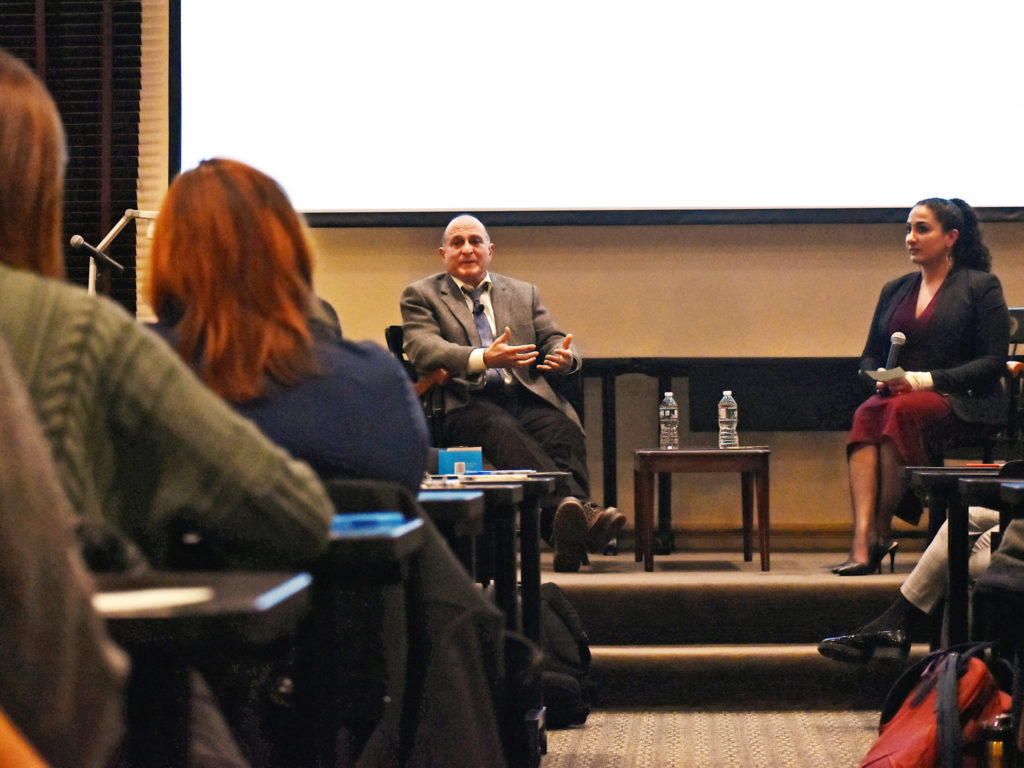Storytelling as truth

Public radio executive Torey Malatia explores bias in news
Storytelling without bias is a critical function of the media at a time when many Americans are divided ideologically across social, cultural and political lines, Torey Malatia told a packed room in Wheaton’s Mary Lyon Hall on Thursday, February 20.
“Journalism is really about self-discipline against our deepest instincts, prejudices and biases. When writing or reporting, we cannot allow those things to color what we are doing. There is only one end purpose of journalism: to communicate information, ideas and concepts that the public will judge,” said Malatia, president and CEO of The Public’s Radio (NPR radio network for Rhode Island and southeastern Massachusetts), who also co-founded NPR’s “This American Life.”
Malatia’s visit to campus was sponsored by a grant from the Andrew W. Mellon Foundation; the $500,000, four-year grant supports course transformations, faculty interest groups and domestic study-away programs that highlight the importance of the humanities as a practical and essential foundation for democracy. As part of the hour-long event, Malatia engaged in a discussion with Touba Ghadessi—associate provost for academic administration and faculty affairs and co-founder of the Wheaton Institute for the Interdisciplinary Humanities—and fielded questions on the role of media in supporting democratic societies.
In the Holman Room, Malatia opened the discussion by examining a quote by Polish philosopher Zygmunt Bauman: “There are friends and enemies. And there are strangers.”
He said it’s human nature to categorize people immediately as friend or enemy. However, the role of a journalist is to approach individuals as strangers, and allow them to share their stories with no presumptions. Through these personal narratives, journalists then can offer glimpses into human experiences that help break down misinformation.
“Journalists should allow the subject to speak, and allow that process to take place. That is how you unravel misinformation, propaganda and a lot of the bad stuff people experience through social media and other means where they just have the wrong information,” he said.
Curiosity, listening skills and cognitive empathy are critical traits of a good journalist. He shared an anecdote about public radio host Ira Glass, who once engaged in a lengthy conversation with a cashier at a grocery store about her bad day at work. His ability to recognize that each person has a compelling story to tell planted the seeds for “This American Life.”
Listening to others, and hearing their stories, is more meaningful than sharing opinions, which Malatia called the biggest, most overrated kind of communication in society. He encouraged attendees to spend time with people who experience the world differently than them, instead of socializing in an echo-chamber of agreement.
“You can find a way to be fascinated by someone, no matter who they are,” he said.
Ghadessi said she suggested to Nancy Kendrick—director of the Mellon grant at Wheaton and professor of philosophy—that they invite Malatia to campus. She knew his work from his days at Chicago’s WBEZ and, more recently, from his collaboration on a podcast called “(PRESS)ed: A Podcast About The Media, Fake News and The Future Of Our Democracy” with the Rhode Island Council for the Humanities, an organization she chairs.
She said Malatia’s career in journalism is a perfect demonstration of how directly humanities disciplines lend themselves to professional practice.
“From discussing the fallacy of objectivity, to questioning the linearity of the journalistic process, Torey pushed our students to think about storytelling as a powerful tool to keep doors open and to listen—truly listen—to different ideas. Torey exemplifies how curiosity and cognitive empathy together with agile use of technology can enact real change through the work done by dedicated journalists everywhere,” Ghadessi said.
